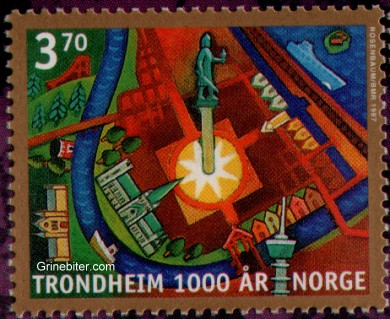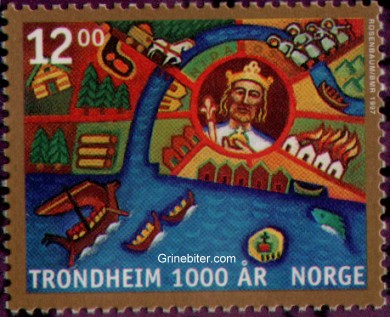|
Trondheim, Norway
In 1997, every day will be a holiday, was one of the mottoes for the celebration of Trondheim’s millennium.
Stamp designer Sarah Rosenbaum envisaged the possibility of making a time map and achieving a kind of journey
in time. But she soon realized that this would not be possible in the format she would be working in, and
solved the problem by dividing it into two parts.
She devoted one stamp to Trondheim, the seat of learning
and national landmark, and the other to the historical city of Trondheim - and in this way she did in fact
achieve a journey back in time.

On the latter stamp, she found room for Vikings and pilgrims, trade and commerce, disaster and prosperity,
but the focal point of the stamp is Saint Olav, who Christianized Norway.

The main theme of both stamps, and that also applies to the ‘modern ‘stamp with the Tyholt Broadcasting Tower and the
old university building, the students’ union and the city bridge, the statue of Olav Tryggvason and the Nidaros Cathedral,
is the city centre which is enclosed in the final loop of the Nid River.
|
|

|
What does Trondheim translate to?
The name Trondheim can be directly translated as the home of the strong and fertile. And the founder of the city,
Olav Tryggvason, was certainly strong: a Viking in every sense of the word, powerful enough to collect ransom
from the king of England, even to threaten London. But that was before he was baptized by King Ethelred,
before he promised never again to attack England and instead set course for Norway to seek power there.
He landed at Skipakrok on the Nid River in 997 and at Nidarneset he built a royal residence and founded the city.
Thanks to Johan Caspar de Cicignon's well-organized plan for the city following the great fire in 1681, it is easy to
find your way about Trondheim. Perhaps this is one of the reasons why the people of Trondelag look on it as home:
they never feel lost there. Trondheim has many attractions, but the most important is the Nidaros Cathedral,
the largest medieval building in any of the Nordic countries. According to the encyclopedia, the construction of
the 102 meter long and 50 meter wide cathedral on the site of Saint Olav’s grave was probably started about the same
time as the establishment of the archbishopric in 1152. It has been rebuilt a number of times.
|

